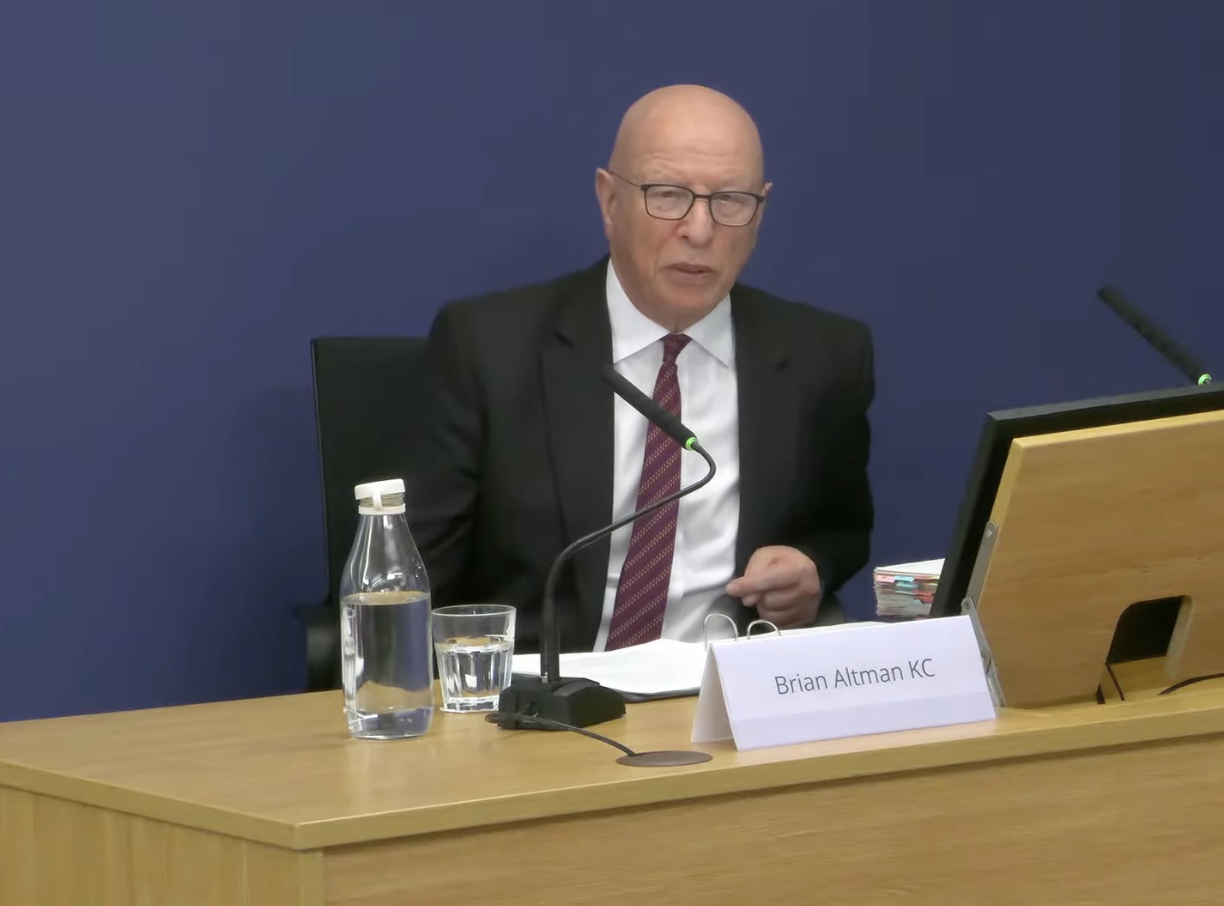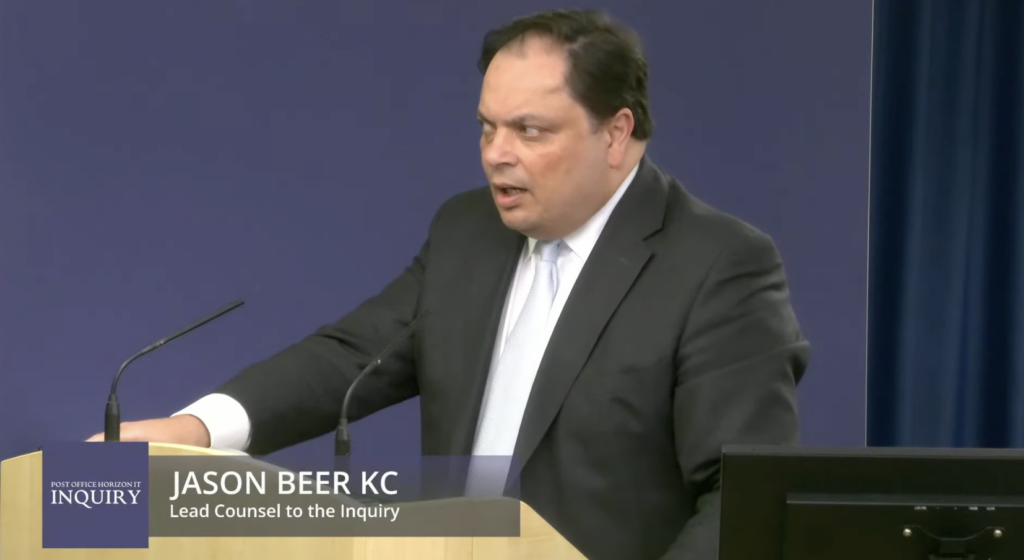
Brian Altman’s role in perpetuating the Post Office scandal is self-evident. He gave advice which helped a bent client keep a lid on a gargantuan miscarriage of justice. Whether that was down to any professional failings was in issue today. Altman had sight of clear evidence of criminal activity (orders to shred documents, misleading a court), massive failures of disclosure (the Misra case), prosecutor misconduct (the Hamilton case), yet he somehow managed to give advices (and, later, set court strategies) which were neatly in line with his client’s wishes.
“Do you think that you might have been set up?” asked Ed Henry KC towards the end of the day.
“It’s a very interesting proposition, Mr Henry”, Altman replied. He then referenced an email chain where the Post Office and their legal advisors were discussing who to get on board to help them in the light of the Clarke Advice and the CK Sift Review.
In the chain, Gavin Matthews from Bond Dickinson purrs approvingly that though Altman has just stepped down as First Senior Treasury Counsel (a very very senior criminal prosecutor), he “has the ear of the DPP/AGs Office” [Director of Public Prosecutions/Attorney General]
“His connections sound useful,” replies Hugh Flemington, the Post Office’s Head of Legal.
Altman told Henry he was dwelling on the idea he was set up as “a thought to wrestle with.”
The brilliant operator
But Altman is no dupe. We were reminded by Sam Stein KC that Altman’s chambers’ website describes him as “one of the greats of the bar” and a “brilliant operator.” So how did he come to find himself, as Ed Henry put it, consistently managing to “back the wrong horse.” What did Altman actually do wrong?
Very little, according to B. Altman KC. The totemic misjudgment he would admit to was his failure to recommend that Seema Misra and others should be told that the Post Office’s expert witness in her trial was “tainted”. This related to the Clarke Advice. Altman accepted several times it was a “misjudgment”, and explained it by saying that “it is something I have thought about and it is something that should have been disclosed to appropriate people.”
So, said Jason Beer KC (who asked questions for most of the day) “nothing was done to inform convicted defendants or those in any ongoing cases that Mr Jenkins had wrongly withheld his knowledge of bugs in the Horizon system.”
“Unhappily that has to be the case,” replied Altman. “With the benefit of hindsight, and having thought an awful lot about this, it’s something that should have been considered for disclosure and disclosed in appropriate cases. No question.”
“And should have been disclosed by you, Mr Altman,” intoned Beer.
“Yeah, yeah, yeah. I’m accepting that” Altman acknowledged.

Shredding order ≠ Teething problem
In Altman’s world, an order from John Scott, the Post Office’s Head of Security, to shred documents was a “cultural” or “teething” problem. He initially claimed the word “cultural” had been coined by Post Office General Counsel Susan Crichton and that “teething” was not something he said in reference to Scott’s order, before grudgingly conceding it had been. He claimed that in no way was he “minimising” what might be perceived as an attempt to pervert the course of justice. When asked why he did nothing about it, Altman told the Inquiry that he was informed that Scott’s “ridiculous” instruction had been “overcome”.
Altman was taken to a letter being written by the Office the Criminal Cases Review Commission which championed his monitoring of the Cartwright King Sift review as “fundamentally sound”. Altman was sent a draft of the letter for his comments. Beer noted the letter failed to inform the CCRC of the Helen Rose report and the Clarke Advice. On the latter, Altman simply said it “should have”. He could not explain why the Helen Rose report wasn’t even mentioned.
Internally it seems Altman’s designation of the CK review as “fundamentally sound” was used in the same way Second Sight’s declaration there were no system-wide issues with Horizon was waved in the faces of people raising queries. Altman was taken to an email by Andy Parsons from (later Womble) Bond Dickinson which stated his conclusion gives the Post Office. “good grounds to resist any formal external review of its historic prosecutions (ie by the Criminal Cases Review Commission).”
Altman was asked if he thought his advice was going to be used in this way. “Absolutely not”, he replied.
Dodgy advice(s)
The most laughable piece of Advice given by Altman was produced on 19 Dec 2013. He declared to his clients:
“I have seen no evidence to suggest that Post Office Ltd exercises its investigations and prosecution function in anything other than a well-organised, structured and efficient manner, through an expert and dedicated team of in-house investigators and lawyers, supported by Cartwright King solicitors and their in-house counsel, as well as
external counsel and agents where required.”
Where, enquired Beer, did he get this from?
“Based on what Post Office had sent to me, I’d met Cartwright King, I’d met Rodric Williams, I’d met Jarnail Singh, once, maybe twice, and I had read by that stage, certainly two of the prosecution files…. and I think the overarching view I’d come up with is reflected in that paragraph.”
Jarnail Singh?! Beer drilled down into this:
JB: Had you examined any documents or material relating to the training of investigators?
BA: I’ve got an idea I might have asked for something, but I can’t remember
JB: Had you examined the knowledge and experience of Post Office investigators?
BA: I think I knew some of them were former police officers.
JB: Was that the extent of it?
BA: I can’t remember.
JB: Had you examined the investigators knowledge of and practical application of the law of disclosure?
BA: No.
JB: Had you examined the extent to which investigators actively investigated all reasonable lines of enquiry, including those which point away from the guilt of a suspect?
BA: No.
JB: Had you investigated what supervision, checks and balances existed if any to superintend the work of the investigators?
BA: Well I understood that Cartwright King were involved, the external agents, and I understood that they were the instructing solicitors. I had met Simon Clarke and I had met Harry Bowyer and I remember being impressed by them.
JB: That’s being impressed by lawyers. I’m asking about the superintendence or supervision of the investigators.
BA: No but I rather thought that Cartwright King had that superintendence.
JB: Had you examined how, in practice, decisions as to whether to prosecute or not were made in practice?
BA: No.
JB: Had you discovered who the decision maker was in relation to any decision to prosecute?
BA: Well, if my memory serves me during the course of this review I had referred to several Post Office policies and I think one of those policies put the ultimate decision in the hands of someone non-legal. So I made a point about that.
JB: Had you examined what the training or experience of that person was?
BA: Of that person, no, but the point I made was that it had to be in the hands of a legal individual.
JB: Did you examine how much consideration that person gave to an analysis of the evidential strength of a case?
BA: No.
JB: Did you examine what tests that decision-maker applied when deciding a case was to be prosecuted?
BA: No.
Beer wondered, “given all those things” how Altman could come to the conclusion that the Post Office “exercises its investigatory function in a well-organised, structured and efficient manner?”
Altman replied that he was talking about a “hierarchical structure”. He wasn’t “deep diving”.
Beer wondered if Altman if there was a “danger” his conclusions could be “misunderstood and therefore misapplied and being used as a weapon by the Post Office in fending off criticisms of it.”
“Yes I can see that”, replied Altman. “At the time I didn’t appreciate that it would be.”
But it was, though, wasn’t it? Which makes Brian Altman very much part of the problem.
I am currently touring Post Office Scandal – the Inside Story until Thu 16 May 2024. There are six more dates remaining in Devon, Dorset, Somerset, Wiltshire, Surrey and Essex. You can find the specific venues and timings here. All look likely to sell out except Swindon (Mon 13 May) which, for some reason is doing quite badly. If you can make it to the Wyvern Theatre in Swindon, I’d love to see you.
The journalism on this blog is crowdfunded. If you would like to join the “secret email” newsletter, please consider making a one-off donation. The money is used to keep the contents of this website free. You will receive irregular, but informative email updates about the Post Office Horizon IT scandal.

Leave a Reply